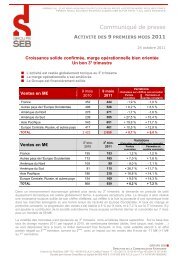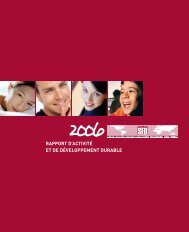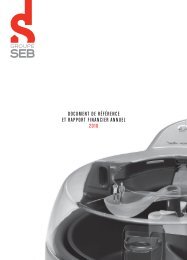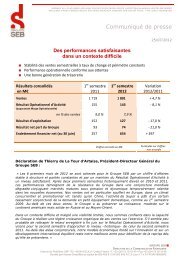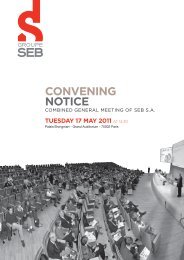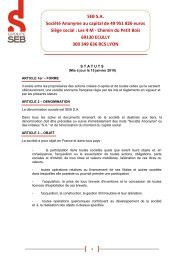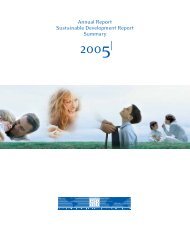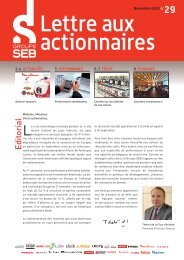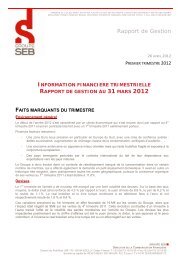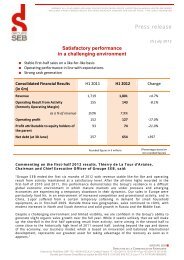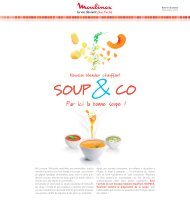financial report and registration document 2011 - Groupe SEB
financial report and registration document 2011 - Groupe SEB
financial report and registration document 2011 - Groupe SEB
You also want an ePaper? Increase the reach of your titles
YUMPU automatically turns print PDFs into web optimized ePapers that Google loves.
Financial Report <strong>and</strong> Registration Document <strong>2011</strong><br />
3<br />
Corporate, social <strong>and</strong> environmental responsibility<br />
Challenges of <strong>Groupe</strong> <strong>SEB</strong><br />
Upholding our commitment to corporate citizenship<br />
Corporate citizenship. In the regions in which it operates, <strong>Groupe</strong> <strong>SEB</strong><br />
acts as a responsible economic stakeholder <strong>and</strong>, in the event that a site<br />
needs to be restructured, it makes every effort to limit the impact of its<br />
decision on the employees <strong>and</strong> local life. The Group is also an active member<br />
of the community. It fosters many connections with local stakeholders<br />
<strong>and</strong> participates in public debates, such as discussions on nutrition <strong>and</strong><br />
health. Its commitment to corporate citizenship is also seen in its corporate<br />
sponsorship policy, which focuses on the promotion of social integration.<br />
This policy is embodied by the <strong>Groupe</strong> <strong>SEB</strong> Corporate Foundation <strong>and</strong> the<br />
many local initiatives carried out by its subsidiaries. Its corporate sponsorship<br />
actions represented a total of €2.2 million in <strong>2011</strong>.<br />
Creating sustainable innovations to meet consumer needs<br />
Consumers. Today’s consumers dem<strong>and</strong> products that take health <strong>and</strong><br />
safety into account. These products need to be environmentally friendly <strong>and</strong><br />
produced in a responsible manner. <strong>Groupe</strong> <strong>SEB</strong> has taken the necessary<br />
steps to ensure strict control over all of these aspects. Each new generation<br />
of products is enhanced by innovations that embody an ever-increasing<br />
respect for people <strong>and</strong> the environment <strong>and</strong> that take health <strong>and</strong> nutritional<br />
Reducing our environmental impact<br />
Eco-design. <strong>Groupe</strong> <strong>SEB</strong>’s eco-design policy aims to limit the environmental<br />
impact of its products throughout their entire life cycle: increasing their<br />
recyclability, prohibiting numerous hazardous materials, reducing the amount<br />
of resources used, reducing energy use in st<strong>and</strong>-by mode, etc. These efforts<br />
drawn on the internal eco-design guide, which will be completely revised in<br />
2012. This new guide, intended for the R&D <strong>and</strong> marketing teams, will include<br />
aspects related to the ability to repair <strong>and</strong> recycle, energy consumption, <strong>and</strong><br />
LCA*, <strong>and</strong> its “materials library” will guide teams in their choice of materials.<br />
Eco-production. In 2004 the Group adopted a worldwide environment<br />
management system aiming, first <strong>and</strong> foremost, to control the use of<br />
resources (water <strong>and</strong> energy) <strong>and</strong> to reduce waste <strong>and</strong> emissions. At yearend<br />
<strong>2011</strong>, 74.3% of the Group’s industrial <strong>and</strong> logistic entities, worldwide,<br />
were certifi ed under the environmental st<strong>and</strong>ard ISO 14001. This fi gure<br />
includes Supor, Imusa <strong>and</strong> Asia Fan. Action plans aiming to reach 100% by<br />
the end of 2013, excluding new acquisitions, have been approved.<br />
Eco-logistics. The transport of products, as well as the materials <strong>and</strong><br />
components used to make these products, is one of the main sources<br />
of greenhouse gas emissions within <strong>Groupe</strong> <strong>SEB</strong>, which clearly hopes to<br />
reduce these emissions. At the end of 2009 an initial balance sheet for<br />
* Life cycle analysis.<br />
concerns into account. The Group also pays close attention to the quality of<br />
its products <strong>and</strong> to the relationship with its consumers. Two key objectives<br />
in the Group’s policy toward consumers are improving after-sales service<br />
<strong>and</strong> encouraging product repairs over replacement. In this regard, the Group<br />
relies on a network of 3,500 licensed repair technicians around the world.<br />
greenhouse gas emissions related to transport was drawn up, <strong>and</strong>, since<br />
then, the Group has continued improving the reliability of the data in this<br />
assessment. To further reduce its emissions, the Group is focusing on two<br />
main areas: maximising the load factor of freight vehicles (trucks or sea<br />
freight containers) <strong>and</strong> increasing the use of alternative, environmentally<br />
friendly modes of transport (waterway, rail, etc.). A Group-wide initiative<br />
has also been deployed across the Group’s manufacturing facilities aiming<br />
to take logistical constraints into consideration from the beginning of the<br />
product <strong>and</strong> packaging development process: EffyPACK (packaging system<br />
for supply chain effi ciency).<br />
Green IT. <strong>Groupe</strong> <strong>SEB</strong> continues to exp<strong>and</strong> its environmentally responsible<br />
IT policy, focusing on three main priorities in 2012: reduction in the number<br />
of printers <strong>and</strong> the amount of paper used in France <strong>and</strong>, later, worldwide;<br />
virtualisation of servers; <strong>and</strong> the integration of sustainability criteria in the<br />
procurement of hardware (computers <strong>and</strong> telephones).<br />
End-of-life. In Europe, the collection <strong>and</strong> processing of small domestic<br />
appliances are managed by eco-organisations. <strong>Groupe</strong> <strong>SEB</strong> is especially<br />
involved in this endeavour in France, where it chairs Éco-Systèmes, the<br />
country’s largest eco-organisation.<br />
GROUPE <strong>SEB</strong><br />
3<br />
45



